The document provides commentary from multiple scholars on the biblical passage describing the allotment of land to the tribe of Simeon. Key details include:
- Simeon's territory fell within the land of Judah because Judah's territory was initially larger than needed and the prophecy of Jacob that Simeon would be divided in Israel.
- Simeon's cities were scattered within Judah's land, fulfilling Jacob's prophecy. This brought the two tribes into alliance and some Simeonites later joined Judah.
- Eighteen cities are listed as being assigned to Simeon, some in the Negeb region and some elsewhere, indicating Simeon's territory was not a single contiguous area



![it was discovered. And though they were guided by the Spirit, there is nothing
strange in their having been partially mistaken, because God sometimes leaves his
servants destitute of the spirit of judgment, and suffers them to act like men on
different occasions, that they may not plume themselves too much on their clear-
sightedness. We may add that the people were punished for their carelessness and
confident haste, because they ought at the outset to have ascertained more
accurately how much land could be properly assigned to each. This they neglected to
do. Through their unskillful procedure, the children of Judah had received a
disproportion accumulation of territory, and equity required that they should
relinquish a part. It would also have been better for themselves to have their limits
fixed with certainty at once than to be subjected to a galling spoliation afterwards.
Add that each tribe had indulged the vain hope that its members would dwell far
and wide, as if the land had been of unlimited extent.
BE SO , "Joshua 19:1. The second lot came forth to Simeon — God disposed it so
by an especial providence, Simeon being the eldest son of Jacob that was
unprovided for. Their inheritance was within the inheritance of Judah — This also
was ordered by God’s providence, partly to fulfil that threatening that he would
divide and scatter this tribe in Israel, (Genesis 49:7,) which was hereby done in part,
because they had no distinct lot, but were as inmates to Judah; partly because now,
upon the more exact survey of the land, it appeared that the part given to Judah did
far exceed the proportion which they needed, or which the other tribes could expect.
And this was the least of the tribes, ( umbers 26:14,) and therefore fittest to be put
within another tribe.
COFFMA , "Verse 1
This chapter details the territories assigned to the remaining six tribes. The first of
these remaining six was Simeon.
SIMEO , "And the second lot came out for Simeon, even for the tribe of the
children of Simeon according to their families: and their inheritance was in the
midst of the inheritance of the children of Judah. And they had for their inheritance
Beer-sheba, or Sheba, and Moladah, and Hazar-shual, and Balah, and Ezem, and
Eltolad, and Bethul, and Hormah, and Ziklag, and Beth-marcaboth, and Hazar-
susah, and Beth-lebaoth, and Sharuhen; thirteen cities and their villages: Ain,
Rimmon, and Ether, and Ashan: and all the villages that were round about these
cities to Baalath-beer, Ramah of the South. This is the inheritance of the tribe of the
children of Simeon according to their families. Out of the part of the inheritance of
the children of Judah was this inheritance of Simeon; for the portion of the children
of Judah was too much for them: therefore the children of Simeon had inheritance
in the midst of their inheritance."
"And the second lot came out for Simeon ..." This was the second lot of this group of
the final seven. "Most of these towns are in the egeb; however, two of them, Ether
and Ashan, are in the Shephelah."[1] This was according to the prophecy in
Deuteronomy 33:6. otice that no boundaries at all are listed here, just these
seventeen cities. The general area in which this inheritance lay was described by](https://image.slidesharecdn.com/joshua19commentary-160726121644/85/Joshua-19-commentary-4-320.jpg)
![Dummelow: "It was in the egeb, or south country, that slopes away from the
Hebron range toward the desert, bounded on the west by the Mediterranean, and on
the east by the Dead Sea and the Valley of Edom.[2] The tribe of Simeon was a
diminishing factor in Israel, the same being, of course, a fulfillment of the
prophecies concerning Simeon.
COKE, "Ver. 1. And the second lot came forth to Simeon— Simeon was the eldest
son of Jacob, who still remained unportioned. The lot, directed by an especial
Providence, gave him a portion, which fully verified the divine promises and
threatenings. Animated by the spirit of God, Jacob, when dying, had declared to
Simeon and Levi, that they should be dispersed in Israel, for their cruelty against
the Shechemites. See Genesis 49:6-7 and Genesis 34. Levi was scattered through all
Palestine, and had no separate province: Simeon is, as it were, shut up in the tribe of
Judah: and thus was the prediction of the holy patriarch accomplished.
ELLICOTT, "I HERITA CE OF SIMEO (Joshua 19:1-9).
(1) Their inheritance was within the inheritance of the children of Judah.—The
southern part of the inheritance of Judah was given up to Simeon. (See Judges 1:3;
Judges 1:17.) In this fact a prophecy was fulfilled; for the effect of the allotment was
to separate Simeon from the tribes with whom he had been united in the journey
through the wilderness (viz., Reuben and Gad), who had cast off Simeon, and united
themselves with the half tribe of Manasseh instead. Being also separated from Levi,
Simeon was still further isolated: with the result that in the final separation of Israel
and Judah, after Solomon’s death, the tribe of Simeon, though adhering to the
kingdom of the ten tribes (for the children of Simeon were counted strangers in
Judah—2 Chronicles 15:9), was separated from the territory of that kingdom by the
whole breadth of the kingdom of Judah. Thus were Jacob’s words brought to pass,
which he spoke on his death-bed regarding Simeon and Levi: I will divide them in
Jacob, and scatter them in Israel.
(2) Beer-sheba.—Bir-es-seba. Sheba (Shema).
(7) Ain, Remmon.—Timm er-Rumâmîn.
The rest of the cities of Simeon are not identified in Conder’s Biblical Gazetteer,
with the exception of Sharuhen (Tell esh-Sherî’ah, north-west of Beer-sheba).
(9) The part of the children of Judah was too much for them.—In Judges 1 we read
that Judah invoked the assistance of Simeon to complete the conquest of his
inheritance, and also assisted Simeon to conquer his. This fact illustrates the
character of the conquest of Canaan by Joshua, and shows that when his work was
done, something was still left for the individual tribes to do.
PETT, "Chapter 19 The Portions of the Remaining Six Tribes.
In this chapter an account is given of the lots of the six remaining tribes, and the](https://image.slidesharecdn.com/joshua19commentary-160726121644/85/Joshua-19-commentary-5-320.jpg)
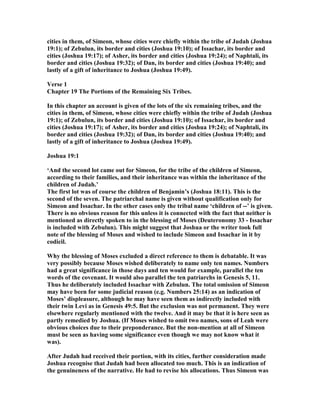


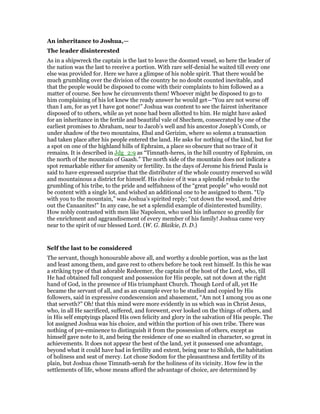
![considerations of piety and the hope of rendering service to God and His people!
Generally a residence is sought which promises gratifications most congenial with their
earthly wishes, or where they may receive the greatest good to themselves, and not
where they may do the greatest good to others. (W. Seaton, M. A.).
2 It included:
Beersheba (or Sheba),[a] Moladah,
CLARKE, "Beer-sheba - The well of the oath. See the note on Gen_21:31.
GILL, "And they had in their inheritance Beersheba and Sheba,.... Or,
Beersheba, that is, Sheba; for so the particle "vau" is sometimes used (z), and must be so
used here; or otherwise, instead of thirteen, it will appear that there are fourteen cities,
contrary to the account of them, Jos_19:6; so Kimchi and Ben Melech make them one
city. And it may be observed, that in the enumeration of the cities of Simeon, 1Ch_4:28;
Sheba is left out, and only Beersheba is mentioned; which, was a well known place in, the
farthest border of the land of Israel southward, and the reason of its name is manifest,
Gen_21:31; See Gill on Jos_15:28,
and Moladah; another of the cities of Judah, Jos_15:26.
K&D, "Jos_19:2-6
Beersheba: see at Jos_15:28. Sheba is wanting in the Chronicles, but has no doubt
been omitted through a copyist's error, as Shema answers to it in Jos_15:26, where it
stands before Moladah just as Sheba does here. - On the names in Jos_19:3-6, see the
exposition of Jos_15:28-32. - The sum total given in Jos_19:6, viz., thirteen towns, does
not tally, as there are fourteen names. On these differences, see the remarks on Jos_
15:32.
PETT, "Verses 2-6
‘And they had in their inheritance Beersheba, that is Sheba, and Moladah, and
Hazar-shual, and Balah, and Ezem, and Eltolad, and Bethul, and Hormah, and
Ziklag, and Beth-marcaboth, and Hazar-susah, and Beth-lebaoth, and Sharuhen.
Thirteen cities with their villages.’](https://image.slidesharecdn.com/joshua19commentary-160726121644/85/Joshua-19-commentary-10-320.jpg)








![beneficial result. There cannot be a doubt that those to whom twenty or even only
seventeen cities are attributed, had more extensive territories. Therefore, all we have
here is a compendious description of the division as it was taken from the general
and confused notes of the surveyors.
K&D, "The Inheritance of Zebulun fell above the plain of Jezreel, between this plain
and the mountains of Naphtali, so that it was bounded by Asher on the west and north-
west (Jos_19:27), by Naphtali on the north and north-east (Jos_19:34), and by Issachar
on the south-east and south, and touched neither the Mediterranean Sea nor the Jordan.
It embraced a very fertile country, however, with the fine broad plain of el Buttauf, the
µέγα πεδίον above Nazareth called Asochis in Joseph. vita, §41, 45 (see Rob. iii. p. 189,
Bibl. Res. pp. 105ff.; Ritter, Erdk. xvi. pp. 742, 758-9).
Jos_19:10
“And the boundary (the territory) of their inheritance was (went) to Sarid.” This is no
doubt the centre of the southern boundary, from which it is traced in a westerly
direction in Jos_19:11, and in an easterly direction in Jos_19:12, in the same manner as
in Jos_16:6. Unfortunately, Sarid cannot be determined with certainty. Knobel's
opinion, is, that the name, which signifies “hole” or “incision,” after the analogy of ד ַר ָ,שׂ
perforavit, and ט ַר ָ,שׂ incidit, does not refer to a town, but to some other locality, probably
the southern opening of the deep and narrow wady which comes down from the basin of
Nazareth, and is about an hour to the south-east of Nazareth, between two steep
mountains (Seetzen, ii. pp. 151-2; Rob. iii. p. 183). This locality appears suitable enough.
But it is also possible that Sarid may be found in one of the two heaps of ruins on the
south side of the Mons praecipitii upon V. de Velde's map (so called from Luk_4:29).
COFFMA , "Verse 10
ZEBULU
"And the third lot came out for the children of Zebulun according to their families.
And the border of their inheritance was unto Sarid; and their border went up
westward, even to Maralah, and reached to Dabbesheth; and it reached to the brook
that is before Jokneam; and it turned from Sarid eastward toward the sunrising
unto the border of Chisloth-tabor; and it went out to Daberath, and went up to
Japhia; and from thence it passed along eastward to Gath-hepher, to Eth-kazin; and
it went out at Rimmon which stretcheth unto eah; and the border turned about it
on the north to Hanna-thon; and the goings out thereof were at the valley of
Iphtahel; and Kattah, and ahalal, and Shimron, and Idalah, and Bethlehem:
twelve cities with their villages. This is the inheritance of the children of Zebulun
according to their families, these cities with their villages."
"This inheritance lay west of azareth and east of Accho."[3] Unger's more
complete description is:
"This was the landlocked district in lower Galilee bordered by Asher on the west,
Manasseh on the south, Issachar on the southeast, and aphtali on the north and](https://image.slidesharecdn.com/joshua19commentary-160726121644/85/Joshua-19-commentary-19-320.jpg)
![northeast. Zebulun was traversed by "the way of the sea" (Isaiah 9:1), a widely
traveled road to the Mediterranean Sea."[4]
It is of interest that the birthplace of Jonah, Gath-hepher, lay within this territory.
The Bethlehem mentioned here, however, was named by the Zebulunites after the
one where Jesus was born.[5] The wisdom of the Lord has been pointed out in this
placement of the children of Leah to the north of the Rachel tribes in order to
procure a greater unity of the children of Israel. This objective "was accomplished
for centuries."[6]
PI K, ""And the third lot came up for the children of Zebulun according to their
families" (Josh. 19:10). The part played by Zebulun in the history of the nation was
not a prominent one, but though referred to rarely as a tribe, each time that
mention is made of them it is of a highly creditable nature. First, we read of them in
Judges 5 where Deborah celebrates in song the notable victory over Jabin and
Sisera, and recounts the parts played therein by the different tribes. In verse 18 we
read, "Zebulun and aphtali were a people that jeoparded their lives unto the death
in the high places of the field." In I Chronicles 12 where we have enumerated those
who "came to David to Hebron, to turn the kingdom of Saul to him," we are told,
"Of Zebulun, such as went forth to battle, expert in war, with all instruments of
war, fifty thousand, which could keep rank: they were not of double heart" (vv. 23,
33). So too they were among those who brought a rich supply of provisions for the
feast on that occasion. But that which mainly characterized it was the maritime
nature of this tribe.
Jacob foretold, "Zebulun shall dwell at the haven of the sea; and he shall be for a
haven of ships; and his border shall be unto Zidon" (Gen. 49:13). Moses also, "And
of Zebulun he said, Rejoice, Zebulun, in thy going out; and Issachar, in thy tents.
They shall call the people unto the mountain; there they shall offer sacrifices of
righteousness: for they shall suck of the abundance of the seas, and of treasures hid
in the sand" (Deut. 33:18, 19). And so it came to pass, for Joshua 19 goes on to say of
the lot of Zebulun "and their border went up toward the sea"—a statement of
seemingly little importance and easily overlooked by the casual reader; yet one
which announced the literal fulfillment of prophecies made centuries before. The
expressions "thy going out" and "they shall suck of the abundance of the seas"
received their accomplishment in their ocean life and trading in foreign parts.
But that which is of interest to the Christian in connection with Zebulun’s portion is
the honorable place which it receives in the ew Testament, for if the character of
the people was praiseworthy, even more notable was the position they occupied in
Palestine. Matthew 4:15, 16, informs us that "the land of Zebulun and the land of
aphtali" (which adjoined it) was none other than "Galilee of the Gentiles,"
concerning which it is said, "The people which sat in darkness saw great light; and
to them which sat in the region and shadow of death light is sprung up." azareth,
where the Savior spent so much of His time when He tabernacled here among men,
was in its borders, and it was also on the shores of its sea that He did so much of His
preaching and wrought so many miracles. Well might the voice of prophecy bid
Zebulun "rejoice" (Deut. 33:18). Therein also we may perceive the deeper and](https://image.slidesharecdn.com/joshua19commentary-160726121644/85/Joshua-19-commentary-20-320.jpg)






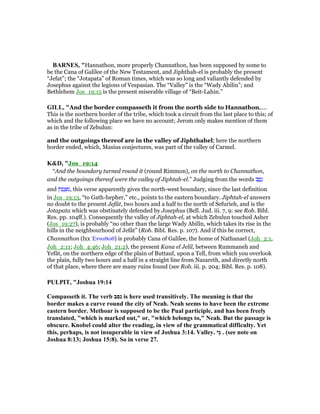

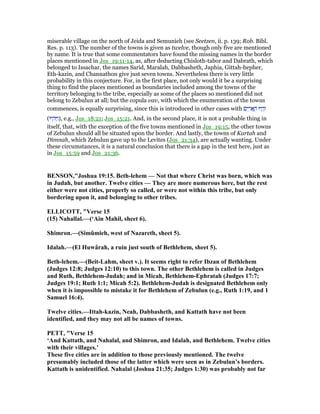


![HE RY 17-23, "The lot of Issachar ran from Jordan in the east to the great sea in the
west, Manasseh on the south, and Zebulun on the north. A numerous tribe, Num_26:25.
Tola, one of the judges, was of this tribe, Jdg_10:1. So was Baasha, one of the kings of
Israel, 1Ki_15:27. The most considerable places in this tribe were, 1. Jezreel, in which
was Ahab's palace, and near it Naboth's vineyard. 2. Shunem, where lived that good
Shunamite that entertained Elisha. 3. The river Kishon, on the banks of which, in this
tribe, Sisera was beaten by Deborah and Barak. 4. The mountains of Gilboa, on which
Saul and Jonathan were slain, which were not far from Endor, where Saul consulted the
witch. 5. The valley of Megiddo, where Josiah was slain near Hadad-rimmon, 2Ki_
23:29; Zec_12:11.
JAMISO , "Jos_19:17-23. Of Issachar.
the fourth lot came out to Issachar — Instead of describing the boundaries of
this tribe, the inspired historian gives a list of its principal cities. These cities are all in
the eastern part of the plain of Esdraelon.
K&D, The Inheritance of Issachar. - In this instance only towns are given, and the
boundaries are not delineated, with the exception of the eastern portion of the northern
boundary and the boundary line; at the same time, they may easily be traced from the
boundaries of the surrounding tribes. Issachar received for the most part the large and
very fertile plain of Jezreel (see at Jos_17:16, and Ritter, Erdk. xvi. pp. 689ff.), and was
bounded on the south by Manasseh, on the west by Manasseh and Asher, on the north
by Zebulun, and farther east by Naphtali also, and on the east by the Jordan.
COFFMA , "Verse 17
ISSACHAR
"The fourth lot came out for Issachar, even for the children of Issachar according to
their families. And their border was unto Jezreel, and Chesulloth, and Shunem, and
Hapharaim, and Shion, and Anaharath, and Rabbith, and Kishion, and Ebez, and
Remeth, and En-gannim, and En-haddah, and Beth-pazzez, and the border reached
to Tabor, and Shahazumah, and Beth-shemesh; and the goings out of their border
were at the Jordan: sixteen cities and their villages. This is the inheritance of the
tribe of the children of Issachar according to their families, the cities and their
villages."
"The lot of Isaachar comprised the plain of Esdraelon",[7] which was part of the
richest land in Palestine, and, as Plummer noted, it is surprising that nothing very
outstanding is afterward attributed to this tribe, with the one exception of the battle
of Tabor. "Possibly the fact that the `lines of this tribe' had fallen in `pleasant
places' tended to induce sloth."[8] Plummer also believed that the property of
Issachar extended to a portion of the coast of the Sea of Galilee, basing his view
upon Isaiah 9:1.
CO STABLE, "Verses 17-23
The inheritance of Issachar19:17-23](https://image.slidesharecdn.com/joshua19commentary-160726121644/85/Joshua-19-commentary-32-320.jpg)


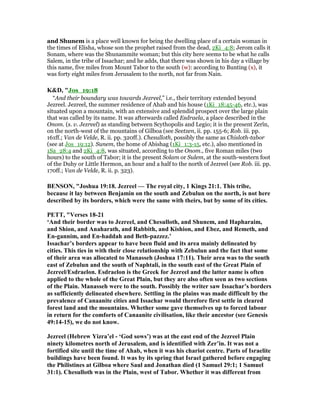









![K&D, "The Inheritance of Asher. - Asher received its territory along the
Mediterranean Sea from Carmel to the northern boundary of Canaan itself. The
description commences with the central portion, viz., the neighbourhood of Acco (Jos_
19:25), going first of all towards the south (Jos_19:26, Jos_19:27), and then to the north
(Jos_19:28, Jos_19:30).
COFFMA , "Verse 24
ASHER
"And the fifth lot came out for the tribe of the children of Asher according to their
families. And their border was Helkath, and Hali, and Beten, and Achshaph, and
Allammelech, and Amad, and Mishal; and it reached to Carmel westward, and to
Shihor-libnah; and it turned toward the sunrising to Beth-dagon, and reached to
Zebulun, and to the valley of Iphtahel northward to Beth-emek and eiel; and it
went out to Cabul on the left hand, and Ebron, and Rehob, and Hammon, and
Kanah, even unto great Sidon; and the border turned to Ramah, and to the fortified
city of Tyre; and the border turned to Hosah; and the goings out thereof were at the
sea by the region of Achzib; Ummah also, and Aphek, and Rehob: twenty and two
cities with their villages. This is the inheritance of the tribe of the children of Asher
according to their families, these cities with their villages."
As noted repeatedly in Judah's inheritance, we have two cities with the same name,
Rehob (Joshua 19:28,30). As Philbeck said, "The tribes of Asher, Zebulun, and
Issachar all joined Manasseh on the south. Asher was the westernmost of these and
claimed the seacoast from Mount Carmel to Tyre; but the tribe's control of all that
area was always tenuous at best."[9] Woudstra pointed out that the summary here
mentions 22 cities, but that if Tyre and Sidon are counted, there are actually 24.[10]
CO STABLE, "Verses 24-31
The inheritance of Asher19:24-31
Asher"s territory stretched along the Mediterranean coastline from where the
Carmel range of mountains meets the Plain of Sharon northward to the northern
border of Canaan. The Phoenicians lived north of Asher on this coast. Asher"s
neighbor on the southeast was Zebulun, and on the east it was aphtali. The writer
mentioned22towns but recorded the names of only a few ( Joshua 19:30).
ELLICOTT, "(24) The fifth lot . . . for . . . Asher . . . (and Joshua 19:32) the sixth . . .
for . . . aphtali.—Asher and aphtali had been associated with Dan in the exodus,
and with him had encamped on the north side of the tabernacle, and had brought
up the rear. These two, each dissociated from his own brother (viz., Asher from Gad
and aphtali from Dan), are paired together in their inheritance in Palestine (comp.
aphtali and Manasseh in Revelation 7, and see ames on the Gates of Pearl, pp.
199, 200). The tribe of Asher was more akin to the house of Judah, for Zilpah, the
mother of Asher, was Leah’s handmaid; and the tribe of to the house of Joseph, for
Bilhah, aphtali’s mother, was Rachel’s handmaid. But in all cases the lot of the
inheritance of the tribe seems to have fallen in such a way as to favour the](https://image.slidesharecdn.com/joshua19commentary-160726121644/85/Joshua-19-commentary-45-320.jpg)



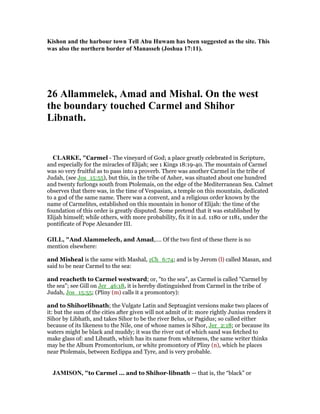




![and thirteen kilometres (eight miles) south east of Acco. Excavations have
discovered Iron Age II buildings and a later fortress marking the border between
Phoenicia and Israel. It was a frontier village between the two exchanged by
Solomon’s treaty with Hiram of Tyre (1 Kings 9:13) to rectify the border.
Ebron (Abdon in some Hebrew MSS) is probably Abdon (Joshua 21:30), probably
Khirbet ‘Abdeh six kilometres (nearly four miles) in from Achzib (Joshua 19:29),
ten miles north north east of Acco, and commanding a way into the hills (In Hebrew
writing d and r are almost indistinguishable except in the most careful writing).
Rehob - ‘broad place’ - (Joshua 21:31; 1 Chronicles 6:75) is possibly Tell Bir el-
Gharbi, south east of Acco. It was one of the cities from which the Canaanites were
not driven out (Judges 1:31), although there may have been two Rehob’s (Joshua
19:30). A Rehob (rhb) is mentioned in the Thutmose III lists. Hammon (‘glowing’)
has been suggested as Umm el-‘Awamid where ruins still exist. A Phoenician
inscription from nearby Ma‘sub refers to ‘the citizens of Hammon’ and ‘the deity of
Hammon’. Kanah is probably Qana in the Lebanon foothills, ten kilometres (six
miles) south east of Tyre.
“Even to Great Zidon.” That is, to the borders of the territory belonging to Zidon.
The use of Great Zidon rather than Tyre indicates the age of the narrative. Later
Tyre became more prominent.
PULPIT, "Joshua 19:27
Beth-dagon. We learn that Dagon, the fish-god, was worshipped here as well as in
the south of Palestine (see Joshua 15:41). The Valley of Jiphthah-el. This valley, or
gai, is mentioned above, Joshua 19:14, as the extreme northern border of Zebulun.
Cabul. We read of a Cabul in 1 Kings 9:11-13, but it can hardly be this place,
though clearly not far off. For we read that the name given to that territory was
given then by Hiram. There is a κωµὴ χαβωλώ πτολεµαίδος µεθόριον οὗσα
mentioned by Josephus. There is a village four hours northeast of Acre, which still
bears this name.
28 It went to Abdon,[b] Rehob, Hammon and
Kanah, as far as Greater Sidon.
BAR ES 28-30, "These verses refer to the northern portion of the territory of Asher,
on the Phoenician frontier. Some names may have dropped out of the text, the number](https://image.slidesharecdn.com/joshua19commentary-160726121644/85/Joshua-19-commentary-54-320.jpg)











![and Hazor, and Kedesh, and Edrei, and En-hazor, and Iron, and Migdael, Horem,
and Beth-anath, and Beth-shemesh; nineteen cities with their villages. This is the
inheritance of the tribe of the children of aphtali according to their families, the
cities with their villages."
" aphtali's border joined that of of Isaachar from Mount Tabor to the Jordan. The
eastern border ran along the shore of the Sea of Galilee and north again with the
eastern border of Asher, aphtali held most of the northern and eastern half of the
southern Galilean highlands."[11] Rea described this same area as "Eastern Upper
and Lower Galilee."[12]
CO STABLE, "Verses 32-39
The inheritance of aphtali19:32-39
The Sea of Chinnereth (Galilee) and the Jordan River north of that sea formed
aphtali"s eastern border. It extended north to Phoenician territory. aphtali
shared borders on the west with Asher, on the southwest with Zebulun, and on the
south with Issachar. ineteen fortified cities belonged to this tribe ( Joshua 19:35-
38).
PETT, "Verse 32
‘For the children of aphtali came out the sixth lot, for the children of aphtali,
according to their families.’
ote the slight differences in the opening formulae - Joshua 18:11; Joshua 19:1;
Joshua 19:10; Joshua 19:17; Joshua 19:24; Joshua 19:32; Joshua 19:40. These are
clearly deliberate variations to prevent exact repetition and monotony. Benjamin,
Simeon, Asher, and Dan (as was Judah (Joshua 15:1) and Reuben (Joshua 13:15))
are called ‘the tribe (matteh) of the children of --’. Zebulun, Issachar and aphtali
only ‘the children of --’ (as was Joseph (Joshua 16:1) and Gad (Joshua 13:24),
although the latter was first called in context ‘the tribe (matteh) of Gad’). Levi was
called ‘the tribe (shebet) of Levi’ (Joshua 13:14; Joshua 13:33) and ‘the Levites’
(Joshua 14:3-4). But as Benjamin is also called ‘the children of --’ (Joshua 18:28)
and Issachar and aphtali ‘the tribe of the children of --’ (Joshua 19:23; Joshua
19:39) and there are changes in the order of words it seems simply to be a matter of
scribal variation.
Simeon and Issachar also have the patriarch’s name by itself. aphtali alone has
‘the children of --’ repeated, but there is no obvious reason for it. ote also that the
lot ‘came up’ for Benjamin and Zebulun, and ‘came out’ for the remainder. This
would suggest that they were drawn from a container.
PI K, ""And the sixth lot came out to the children of aphtali" (Josh. 19:32). This
is also of most interest to us because of its ew Testament connections. Its territory
adjoined that of Zebulun (Matthew 4:13), yet each had its own distinct interest.
Jacob likened aphtali to "a hind let loose" and foretold, "he giveth goodly words"
(Gen. 49:21): while Moses spoke of him as "full with the blessing of the Lord"
(Deut. 33:23). In the title to Psalm 22 our Lord is likened to "the hind of the](https://image.slidesharecdn.com/joshua19commentary-160726121644/85/Joshua-19-commentary-66-320.jpg)
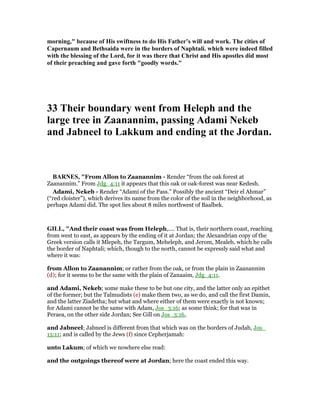

![Heleph.—(Beit Lif, sheet 4). The plain of Bitzanannim (Kh.-Bessum, sheet 6). Adami
(Kh.-Admah, sheet 9): this is the southernmost of all the towns named. ekeb (Kh.-
Seiyâdeh, sheet 6). Jabneel (Yemma, sheet 5). All the above places, except Heleph, lie
near the Sea of Galilee, on the south-west side.
PETT, "Verse 33
‘And their border was from Heleph, from the oak in Zaanannim, and Adami-nekeb,
and Jabneel to Lakkum, and its goings out were at Jordan.’
In view of the fact that ‘the oak in Zaanannim (or ‘of Bezaanannim’)’ is in each case
identified by a place name (Heleph here, compare Judges 4:11 where it is Kedesh(-
naphtali?)), this may be a description of a certain type of sacred oak rather than the
same tree. Thus the border begins from the sacred tree at Heleph (possibly Khirbet
‘Irbadeh at the foot of Mount Tabor). However some have placed Zaanannim at
Khan et-Tuggar four kilometres north east of Tabor.
Adami-nekeb (‘the pass Adami’) has been identified with modern Khirbet ed-
Damiyeh eight kilometres (five miles) south west of Hammath on the sea of Galilee
(near the later Tiberias). For Jabneel modern Khirbet Yamma (or Tell en- a’am),
eleven kilometres (seven miles) south west of Hammath has been suggested. For
Lakkum Khirbet el-Mansurah has been posited. The border then finished at the
Jordan. This seems to be describing the south east border of aphtali.
PULPIT, "Joshua 19:33
From Allon to Zaanannim. Or, the oak which is at Zaanannim (cf. Allon-bachuth,
the oak of weeping, Genesis 35:8). Zaanannim is the same as the Zaanaim
mentioned in 4:11. For (1) the Keri is Zaanannim there, and the word here rightly
translated "oak" is rendered there "plain," as in Genesis 12:6 and elsewhere. It has
been supposed to lie northwest of Lake Huleh, the ancient Merom, whence we find
that the scene of that famous battle was assigned to the tribe of aphtali. The
border of aphtali is more lightly traced than any previous one, and is regarded as
being sufficiently defined, save toward the north, by the boundaries of the other
tribes.
34 The boundary ran west through Aznoth Tabor
and came out at Hukkok. It touched Zebulun on
the south, Asher on the west and the Jordan[c] on
the east.](https://image.slidesharecdn.com/joshua19commentary-160726121644/85/Joshua-19-commentary-69-320.jpg)
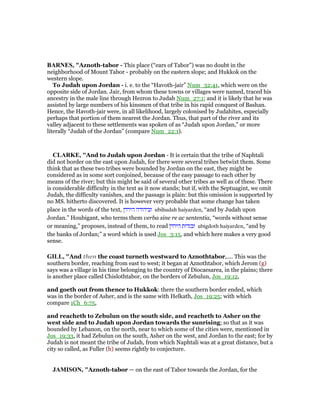
![border ran thence to Hukkok, touching upon that of Zebulun; and as the territory of
Zebulun did not extend as far as the Jordan, Aznoth-tabor and Hukkok must have been
border towns on the line which separated Naphtali from Issachar.
to Judah upon Jordan toward the sunrising — The sixty cities, Havoth-jair,
which were on the eastern side of the Jordan, opposite Naphtali, were reckoned as
belonging to Judah, because Jair, their possessor, was a descendant of Judah (1Ch_2:4-
22) [Keil].
K&D, "Jos_19:34
From the Jordan below the Lake of Tiberias, or speaking more exactly, from the point
at which the Wady Bessum enters the Jordan, “the boundary (of Asher) turned
westwards to Asnoth-tabor, and went thence out to Hukkok.” This boundary, i.e., the
southern boundary of Asher, probably followed the course of the Wady Bessum from the
Jordan, which wady was the boundary of Issachar on the north-east, and then ran most
likely from Kefr Sabt (see at Jos_19:22) to Asnoth-tabor, i.e., according to the Onom. (s.
v. Azanoth), a vicus ad regionem Diocaesareae pertinens in campestribus, probably on
the south-east of Diocaesarea, i.e., Sepphoris, not far from Tabor, to which the
boundary of Issachar extended (Jos_19:22). Hukkok has not yet been traced. Robinson
(Bibl. Res. p. 82) and Van de Velde (Mem. p. 322) are inclined to follow Rabbi Parchi of
the fourteenth century, and identify this place with the village of Yakûk, on the north-
west of the Lake of Gennesareth; but this village is too far to the north-east to have
formed the terminal point of the southern boundary of Naphtali, as it ran westwards
from the Jordan. After this Naphtali touched “Zebulun on the south, Asher on the west,
and Judah by the Jordan toward the sun-rising or east.” “The Jordan” is in apposition
to “Judah,” in the sense of “Judah of the Jordan,” like “Jordan of Jericho” in Num_22:1;
Num_26:3, etc. The Masoretic pointing, which separates these two words, was founded
upon some false notion respecting this definition of the boundary, and caused the
commentators great perplexity, until C. v. Raumer succeeded in removing the difficulty,
by showing that the district of the sixty towns of Jair, which was upon the eastern side of
the Jordan, is called Judah here, or reckoned as belonging to Judah, because Jair, the
possessor of these towns, was a descendant of Judah on the father's side through Hezron
(1Ch_2:5, 1Ch_2:21-22); whereas in Jos_13:30, and Num_32:41, he is reckoned contra
morem, i.e., against the rule laid down in Num_36:7, as a descendant of Manasseh, on
account of his descent from Machir the Manassite, on his mother's side.
(Note: See C. v. Raumer's article on “Judaea on the east of Jordan,” in Tholuck's
litt. Anz. 1834, Nos. 1 and 2, and his Palästina, pp. 233ff. ed. 4; and for the arbitrary
attempts that had been made to explain the passage by alterations of the text and in
other ways, see Rosenmüller's Bibl. Alterthk. ii. 1, pp. 301-2; and Keil's Comm. on
Joshua, pp. 438-9.)
BE SO , "Verse 34-35
Joshua 19:34-35. And to Judah upon Jordan — It was not near Judah, there being
several tribes between them. Therefore the meaning is, this tribe had a
communication with that of Judah, by means of the river Jordan. So the word upon,
in our translation, ought to be interpreted. This river afforded them the convenience
of carrying merchandises to Judah, or bringing them from thence. And thus, some
think, the prophecy of Moses was accomplished, (Deuteronomy 33:23.) Possess thou
the west and the south; which doth not signify that they had any land in the south;](https://image.slidesharecdn.com/joshua19commentary-160726121644/85/Joshua-19-commentary-71-320.jpg)










![Bethel and Dan (1 Kings 12:28, 29, and cf. 2 Kings 10:29).
"When they had made an end of dividing the land for inheritance by their coasts,
the children of Israel gave an inheritance to Joshua the son of un among them:
according to the word of the Lord they gave him the city which he asked, Timnath-
serah in mount Ephraim; and he built the city, and dwelt therein" (Josh. 19:49, 50).
Blessed is it to see that, though the greatest and boldest among them, the one who
had led Israel to the conquest of Canaan, instead of seeking first his own portion, he
waited till all had received theirs. Thus did he put the public good before his private
interests, seeking theirs and not his own. "Our Lord Jesus thus came and dwelt
among us, not in pomp, but in poverty, providing rest for us, yet Himself not having
where to lay His head" (Matthew Henry). or did Joshua seize his portion as a
right, but, like his grand Antitype, "asked" for it (Ps. 2:8). And as Christ built the
Church and indwells it, so Joshua built his city.
COFFMA , "Verse 40
DA
"The seventh lot came out for the tribe of the children of Dan according to their
families. And the border of their inheritance was Zorah, and Eshtaol, and
Irshemesh, and Shaalabbin, and Aijalon, and Ithlah, and Elon, and Timneh, and
Ekron, and Eltekeh, and Gibbethon, and Baalath, and Jehud, and Bene-berak, and
Gath-rimmon, and Mejarkon, and Rakkon, with the border over against Joppa.
And the border of the children of Dan went out beyond them; for the children of
Dan went up and fought against Leshem, and took it, and smote it with the edge of
the sword, and possessed it, and dwelt therein, and called Leshem, Dan, after their
name of Dan their father. This is the inheritance of the tribe of the children of Dan
according to their families, these cities and their villages."
The mention here of Dan's fighting against Leshem is a reference to a later apostasy
of that tribe (Judges 17-18). Dan proved to be unable to wrest the coastal cities away
from the Philistines. "This inheritance assigned to Dan was extremely small, but it
was also extremely fertile."[13] This area was described as "too small for Dan," but,
in reality, Dan simply preferred to live somewhere else. A full description of Dan's
northward migration is found in Judges 18. This tribe did not figure significantly in
the subsequent history of Israel. They had only one hero, Samson; and his exploits
seem to have been limited to a small area and to his own tribe alone.
CO STABLE, "Verses 40-48
The inheritance of Daniel 19:40-48
Dan received territory primarily in the Shephelah and Coastal Plain west of
Benjamin, between Judah and Ephraim. Its land was extremely fruitful.
"The Amorites, who settled portions of the Philistine plain ( Judges 1:34), drove the
Danites out of the plains and into the hills. This led to a migration of part of the
tribe of Dan northward to Leshem near the northern part of aphtali (cf. Judges](https://image.slidesharecdn.com/joshua19commentary-160726121644/85/Joshua-19-commentary-82-320.jpg)
![17-18)." [ ote: Davis and Whitcomb, p83.]
Dan possessed19 towns ( Joshua 19:41-47). The record of the conquest of Leshem (
Joshua 19:47, also called Laish and later Dan) is in Judges 18. [ ote: See John C. H.
Laughlin, " Daniel ," Biblical Illustrator9:4 (Summer1983):40-46.]
41 The territory of their inheritance included:
Zorah, Eshtaol, Ir Shemesh,
CLARKE, "Zorah, and Eshtaol - See the note on Jos_15:33.
Ir-shemesh - The city of sun; another proof of the idolatry of the Canaanites. Some
think this was the same as Beth-shemesh.
GILL, "And the coast of their inheritance was Zorah, and Eshtaol,.... The tribe
of Dan is not described by places the boundaries of it, as other tribes, but by its cities,
which were chiefly, at least several of them, taken out of the tribe of Judah, as the two
first of these most manifestly were; See Gill on Jos_15:33,
and Irshemesh signifies the city of the sun, as the Targum interprets it, and was so
called very probably from a temple in it, dedicated to the idolatrous worship of the sun,
but a different place from Bethshemesh in other tribes; though those of that name, as
this, had it for the like reason; and so Heliopolis, in Egypt, which signifies the same,
where was a temple of the same kind; as there was another city of this name, between
the mountains of Libanus and Antilibanus, now called Balbec (p), where the ruins of the
temple are yet to be seen: but this was a different place, the Septuagint version calls it
Sammaus, and it was, according to Jerom (q), the same with Emmaus, afterwards called
Nicopolis; which, if the same Emmaus with that in Luk_24:13; though some doubt it,
was sixty furlongs from Jerusalem, or seven miles and a half.
K&D, "Jos_19:41-42
From Judah the families of Dan received Zorea and Eshtaol (see at Jos_15:33), and
Ir-shemesh, also called Beth-shemesh (1Ki_4:9), on the border of Judah (see Jos_15:10);
but of these the Danites did not take possession, as they were given up by Judah to the
Levites (Jos_21:16 : see at Jos_15:10). Saalabbin, or Saalbim, which remained in the
hands of the Canaanites (Jdg_1:35), is frequently mentioned in the history of David and
Solomon (2Sa_23:32; 1Ch_11:33; 1Ki_4:9). It may possibly be the present Selbît (Rob.](https://image.slidesharecdn.com/joshua19commentary-160726121644/85/Joshua-19-commentary-83-320.jpg)


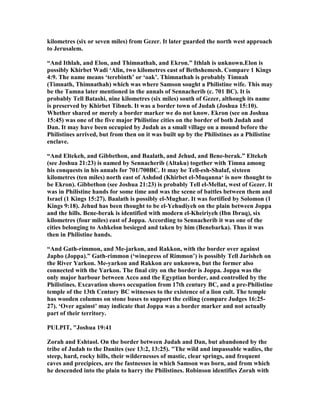





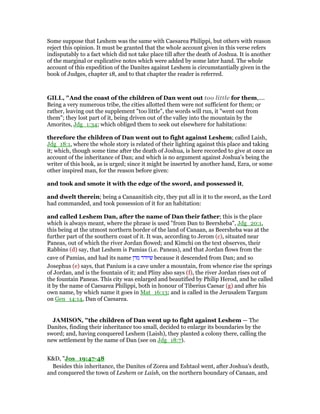


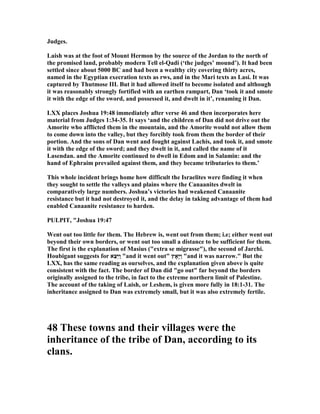
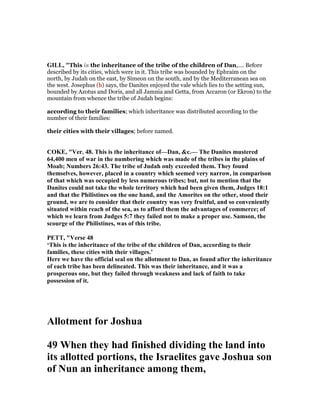


![Joshua 19:49. When they had made an end of dividing the land — That is, after
every tribe had had their respective portion assigned to them. The children of Israel
gave an inheritance to Joshua — We cannot but admire the wonderful modesty of
this great man, who received his portion last of all, and then, not by lot, but by their
gift, who were already possessed of the whole land.
COFFMA , "Verse 49
JOSHUA
"So they made an end for inheritance by the borders thereof, and the children of
Israel gave an inheritance to Joshua the son of un in the midst of them according
to the commandment of Jehovah they gave him the city which he asked, even
Timnath-serah in the hill-country of Ephraim; and he built the city, and dwelt
therein."
How noble it was on Joshua's part to wait until all the tribes had received their
inheritances before he came forward to ask for his own. The exact location of this
estate of Joshua is not known.
COKE, "Ver. 49. The children of Israel gave an inheritance to Joshua— How
admirable is Joshua's moderation! every tribe had shared in the division; each had,
as it were, its reward; and he alone seemed to be overlooked in the distribution of
the conquered country: last of all, he receives a private settlement; not by lot, but
from the tribes, as the gift of the people. Many things might be said upon this head,
and many lessons of disinterestedness given to persons, who, elevated to the highest
offices, are thereby become depositaries of the public good.
CO STABLE, "Verse 49-50
The inheritance of Joshua 19:49-50
Like Caleb, Joshua received a city, Timnath-serah (called Timnath-heres in Judges
2:9), within his tribal allotment of Ephraim, for being faithful to God.
"Caleb and Joshua were the two faithful spies who believed God was able to give
Israel the land ( umbers 14:6-9; umbers 14:30). The receiving of their
inheritances frames the story of the dividing of the land among the nine and a half
tribes, with Caleb"s at the beginning [ Joshua 14:6-15] and Joshua"s at the end.
Caleb and Joshua are living examples of God"s faithfulness in fulfilling his
promises made more than forty years earlier." [ ote: Madvig, p324.]
ELLICOTT, "(49, 50) When they had made an end . . . gave an inheritance to
Joshua . . . according to the word of the Lord they gave him the city which he asked,
even Timnath-serah in mount Ephraim (Kefr Hâris, sheet 14).—Historically and
typically the fact is noticeable. (a) Historically. Joshua waited for his own
inheritance until the last. He sought not his own interest, but that of the people. He
asked no kingdom for himself or his family, only a city, which he built, and dwelt
therein. (6) Typically. “They gave him the city which he asked, according to the](https://image.slidesharecdn.com/joshua19commentary-160726121644/85/Joshua-19-commentary-99-320.jpg)
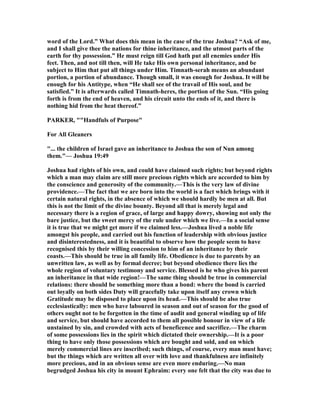
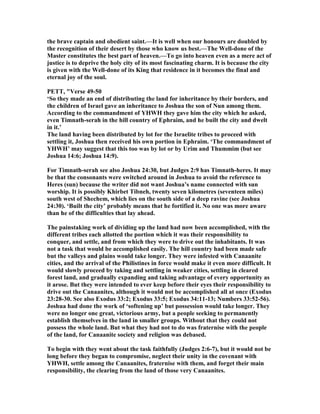

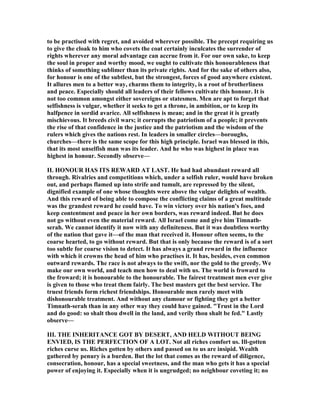

![50 as the Lord had commanded. They gave him
the town he asked for—Timnath Serah[d] in the
hill country of Ephraim. And he built up the town
and settled there.
BAR ES, "Nothing is said of any express command of God respecting the
inheritance of Joshua. But as such special portion appears to have been promised to
Caleb at the time when he and Joshua alone out of the twelve spies remained faithful
Jos_14:6-9, it is probable that a like promise was made to Joshua. The name of the place
is also written Timnath-heres Jdg_2:9, by a transposition of the letters. The rabbinical
explanation that the name Timnath-heres (i. e. “portion of the sun”) was given because a
representation of the sun was affixed to the tomb in memory of Joshua’s command to
the sun to stand still, appears to be an afterthought. The name Timnath-serah (“portion
that remains”) was perhaps conferred on the spot in consequence of its being allotted to
Joshua, the last allotment made in the whole distribution of his conquests. The site has
been conjectured to be “Tibneh,” a village about five miles north-west of Lydda (or, by
Conder, Kerr Hares, nine miles south of Nablous).
CLARKE, "Timnath-serah - Called Timnath-heres in Jdg_2:9, where we find that
the mountain on which it was built was called Gaash. It is generally allowed to have been
a barren spot in a barren country.
GILL, "According to the word of the Lord,.... Or mouth of the Lord; either
according to the oracle of Urim and Thummim, which Eleazar consulted on this
occasion; or according to what the Lord had said to Moses, at the same time that Hebron
was ordered to Caleb, Jos_14:6; and
they gave him the city which he asked, even Timnathserah in Mount
Ephraim; he chose a place in his own tribe, for he was of the tribe of Ephraim; and it
seems that what he chose was none of the best of places; for Paula, as Jerom (i) relates,
when she travelled into those parts, wondered that the distributor of the possessions of
the children of Israel should choose such a rough and mountainous place for himself; of
its situation, see Jos_24:30,
and he built the city, and dwelt therein; he rebuilt it, and fitted it for his own](https://image.slidesharecdn.com/joshua19commentary-160726121644/85/Joshua-19-commentary-105-320.jpg)



![the land, it deserves our remarking, that the lot fell to the several tribes just as
Jacob and Moses had foretold. And this division served to keep up the distinction of
tribes, which was to continue till the coming of the Messiah. And we may observe
further, that God had expressly named, some years before, as we find by umbers
34:17-29, the very persons who should divide the land unto the children of Israel,
and expressly described the bounds how far every way the land reached which was
to be divided by them.
COFFMA , "Verse 51
"These are the inheritances, which Eleazar the priest, and Joshua the son of un,
and the heads of the fathers houses of the tribes of the children of Israel, distributed
for inheritance by lot in Shiloh before Jehovah, at the door of the tent of meeting. So
they made an end of dividing the land."
The division of Canaan among the tribes was conducted in all fairness and in such a
manner as absolutely to preclude any charges of partiality or deceit.
The High Priest who presided over the religion of Israel, the military leader of the
nation, and the heads of the fathers' houses (the princes of Israel) were all present to
oversee and conduct the casting of lots, which in all probability was done by Joshua.
Many wonderful lessons should be drawn from this.
The very details and the perfect agreement of all these assignments with each other
and with the larger record of the total boundaries assures the authenticity of the
narrative. The forging of such a record as this would be an absolute impossibility.
That the offices of holy religion were honored and respected in this important task
is most evident in the presence of Eleazar. Today, it may be feared that our nation
has forgotten God. His name is not even invoked in the public schools of the people,
and even wars are declared and conducted apart from any consultation regarding
"What is the will of God?" We wish to close this chapter by citing a quotation from
Plummer:
"However much the Israelites may have quarreled among themselves, there is not a
hint of dissatisfaction with the final distribution."[14]
From this it is most evident that all Israel accepted the distribution as the gift of
God and consented to receive their various portions as having been received from
God Himself. This is the most powerful evidence of the truth and integrity of the
entire Biblical narrative.
COKE, "Ver. 51. So they made an end of dividing the country— otwithstanding
all the particulars of this division recorded in the present and foregoing chapters, it
is impossible at this time to draw out a perfectly exact map of the land of Canaan,
and the limits of each tribe. The country has undergone too many revolutions, and
passed through too many hands, to allow us the gratification of describing the
position of most of the places of which Joshua chiefly has preserved any account.
The territories of the ten tribes, especially, cannot but be unknown in many
respects; for, on the return of the two tribes of Judah and Benjamin from Babylon,](https://image.slidesharecdn.com/joshua19commentary-160726121644/85/Joshua-19-commentary-109-320.jpg)
![they who came back found themselves hardly sufficient for re-peopling the single
country of Judea; and it even required consideration how to afford Jerusalem a
sufficient number of inhabitants: ehemiah 11. Thus it was the furthest from their
thoughts to take any account of the provinces which the other ten tribes had been
obliged to quit; and, the country being seized on by foreign nations, it became every
day more difficult to mark out the precise limits of the land which had been
possessed by each tribe. See Walton's Prolegom. and Shuckford's Connection, vol.
3: p. 417.
CO STABLE, "Verse 51
The conclusion of the allotment19:51
Israel"s leaders completed this division of the land at Shiloh, the new location of the
tabernacle.
"The gift of the land brought blessings not only to the nation as a whole and to the
individual tribes. It also brought blessing to the faithful leader. God commanded
Israel to reward the individual for his faithfulness. Thus the Deuteronomic
understanding of blessing and curse is expressed not only on the corporate, but also
on the individual level. This, too, stands as a source of encouragement to Israel
through the years as many of her people become dispersed from the main body of
the people of God." [ ote: Butler, p208.]
Readers of this section of the text (chs14-19) notice that the writer gave much more
space to the first tribes he described and progressively less attention to the
remaining tribes. There seem to be several reasons for this. First, he gave the tribes
of Judah and Joseph special attention because Judah and Joseph received Jacob"s
blessing and birthright respectively. This made them the preeminent tribes among
the others. Second, Judah and Joseph therefore became more significant in the
history of Israel as the nation matured, so the historical importance of their
territories was greater than that of less influential tribes. Benjamin likewise became
quite important, and this is probably a reason the writer gave this territory some
attention. Third, the writer clearly did not intend that the listing of tribal
boundaries and towns should be complete. His record of the allotment that each
tribe received, considering all the tribes together, seems intended more to stress the
faithfulness of God in giving Israel what He had promised. This purpose is
especially clear in the listing of Simeon"s towns. Similarly, Moses chose only
selected laws to record in Exodus through Deuteronomy to make certain
impressions on the reader, not that these were the only laws that God gave His
people.
PULPIT, "Joshua 19:51
At the door of the tabernacle of the congregation. The lots were drawn under Divine
sanction. The ruler of the State and the ruler of the Church combined in this sacred
act, hallowed by all the rites of religion, and confirmed by the presence and
approbation of the heads or representatives of all the tribes. Accordingly, as has](https://image.slidesharecdn.com/joshua19commentary-160726121644/85/Joshua-19-commentary-110-320.jpg)
